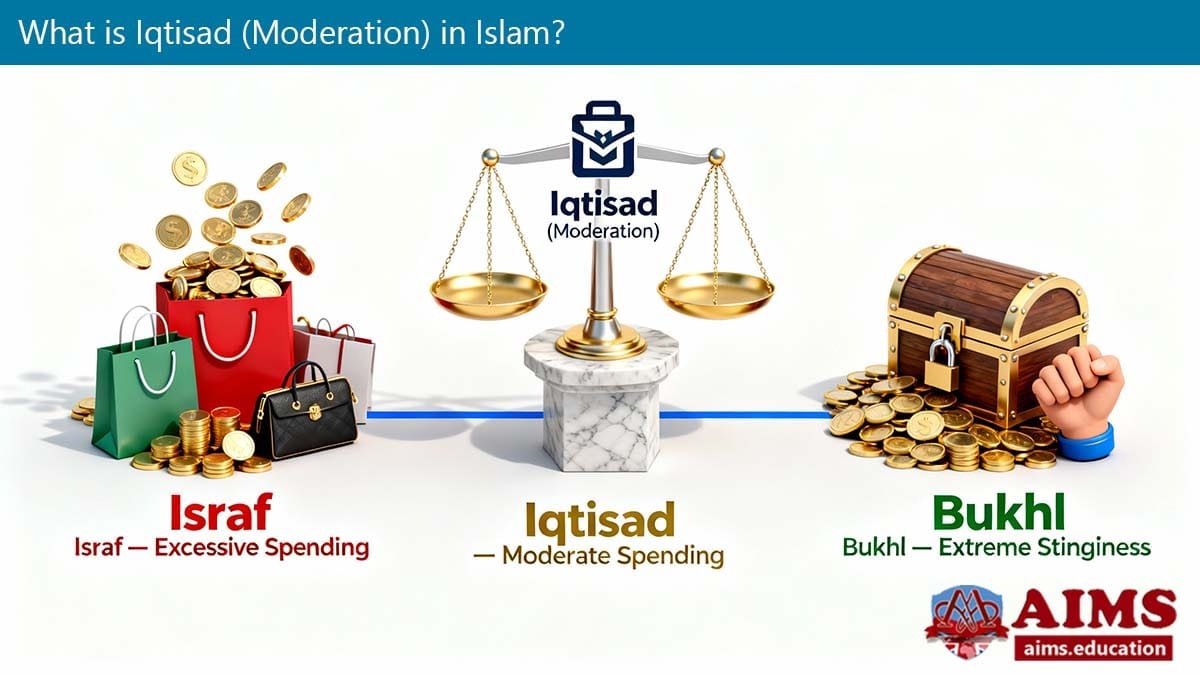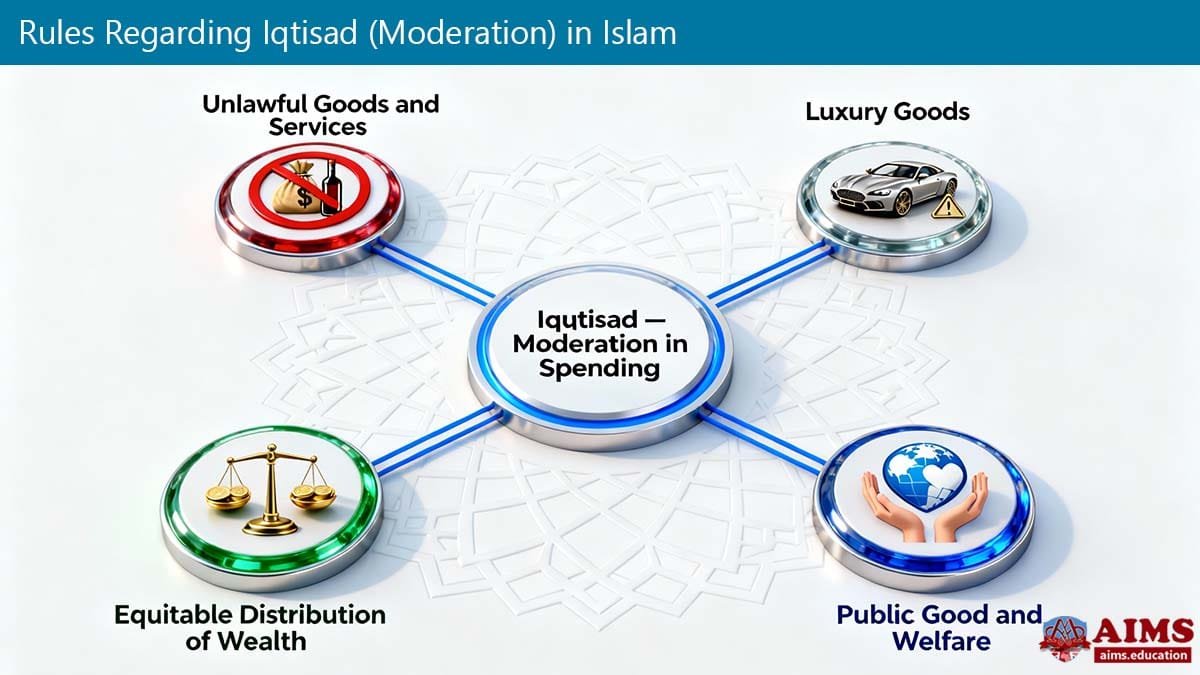What is Iqtisad and Ilm-ul-Iqtisad?
The term Iqtisad (اقتصاد) is derived from the Arabic word “Qas’d” (قصد), which means to signify moderation or balance in spending, actions and behavior. In Islam, Iqtisa’d implies a moderate approach between extravagance (اسراف) and miserliness (بخل). It encourages a middle course in spending and avoids extremes of hoarding and frugality. Generally, Ilm ul Iqtisad is referred to as Economics in modern English. Al-Iqtisad embraces the study of Shariah rules related to various economic activities, including banking, finance, trade, industry, economics, and commerce.
Key Features of Iqtisad
- Iqtisad is an important aspect of Muslim society. It aims to align economic practices with ethical and moral guidelines that deal with Shariah thoughts.
- Iqtisad provides a better understanding of Islamic banking and finance by exploring a number of interconnected topics, such as prohibition of interest (Riba), ethical business practices, wealth distribution, and risk-sharing.
- Iqtisad offers a comprehensive system that integrates spiritual and material well-being. This approach ensures justice, equity, and social welfare, reflecting the core values of activities in Islamic economic.
Concept of Iqtisad in the Quran
The Quran clarifies the concept of Iqtisad in various ways. Below are some of the Quranic verses about the concept.
“Who, when they spend, are neither extravagant nor miserly but keep the golden mean between the two extremes ….”.
Quran Surah Al-Furqan, Verse 67
“O ye who believe! Observe your duty to Allah, and give up what remaineth from usury, if ye are (in truth) believers”.
Quran Surah Baqarah, Verse 278
“And of their taking usury when were forbidden it, and of their devouring people’s wealth by false pretences, We have prepared for those of them who disbelieve a painful doom”.
Quran Surah An-Nisa, Verse 161
“Who brings you your sustenance from the skies, and the earth? Is there any God besides Allah”.
Quran Surah Al-Naml, Verse 57
“We have given you, your means of livelihood, and also for those whom you do not feed”.
Quran Surah Al-Hijr, Verse 20
“He, it is Who created for you all that is on earth. Then, He rose over towards the heaven, and made them seven heavens, and He is the All-Knower of everything”.
Quran Surah Al-Baqarah, Verse 29
““That which ye give in usury in that may increase on (other) people’s property hath no increase with Allah; but that which ye invest as zakat, seeking Allah’s countenance, hath increase manifold”.
Quran Surah Ar-Rum, Verse 39
Iqtisad in Hadith
Islamic economics teaches us to follow the principles of Iqtisad, and it is considered an ideal means of eliminating the drawbacks of capitalism and socialism. The hadith of Prophet Muhammad (Peace Be Upon Him) explains to us the of true spirit and importance of Iqtisad in the Islamic economics:
““He who has weapons and tools more than his needs and strength, should give them to the weak, and he who has food and nourishments above his needs, should give them to the pauper and the needy”.
Hadith

Iqtisad and the Islamic Socio-Economic Order
Islam does not dedicate a special chapter under the title of ‘Economic Order’ because it comprehends a universal philosophy, a comprehensive invitation, and an all embraces revolution. It addresses not only the economic life of human beings but also provides guidance about other dimensions of their life, including the spiritual, ethical, political, and other social spheres. At its core, Islam highlights that the ultimate objective of human life extends beyond worldly success and material achievements. Ilm-al-Iqtisad is an essential part of the Islamic economic system, and principles of Iqtisad are covered in detail during AIMS’ online Islamic finance course and online Islamic banking and finance diploma programs. These qualifications also lead to a globally recognized and accredited Masters degree program in Islamic banking and finance.
Islam teaches that the true purpose of life is to achieve the pleasure of Allah under the supervision of His divine guidance. This integrative approach makes Islam a unique and complete system for humanity.
How Iqtisad Defines a Way of Life?
According to the Islamic perspective, success is not defined as an increase in wealth but as attaining Allah’s blessings. Muslim consumers spend their resources not only on their goods and services but also dedicate a portion of their income to Allah.
In contrast, the other economic systems only focus on goods and services. Therefore, the expenditures of Muslim consumers are categorized as:
- Spending on goods and services only to fulfill their responsibilities and personal needs necessary for survival.
- Spending in the way of Allah (such as Sadaqah, Zakat, or for helping others) to fulfill communal and spiritual responsibilities
Example of Iqtisad in a Human Life
The following example can clarify the concept of Iqtisad.
A non-Muslim consumer may spend on luxuries for satisfaction because their decision is purely based on material benefits or personal preferences. Meanwhile, Muslim consumer who is guided by Islamic rationalism seeks the courtesy of Allah and will follow the rules of iqtisad in all their spending.
Therefore, this perspective makes spending on luxuries a negative utility because it has no eternal utility. As a result, extravagance in spending for a Muslim consumer becomes disutility instead of utility. Hence, the Muslims will not consume it.
Shariah Rules Regarding Iqtisad
Muslims must consider the following factors for spending:
1. Unlawful Goods and Services
In an Islamic Society, the demand for unlawful goods and services (like alcohol, prohibited food items, or gambling (maysir), etc.) is strictly prohibited.
2. Luxury Goods
As Islam focuses on ijtihad or moderation, so the spending on luxury goods is restricted.
3. Equitable Distribution of Wealth
According to Islamic teaching, the equitable distribution of wealth ensures that basic needs should be fulfilled for all.
4. Public good and welfare
If the principles of Al-iqtisad are applied in life, it will reduce the demand for luxury goods. That will increase financial resources or funds, which can be contributed to public good and welfare development such as education, defence, propagation of religion, etc.
The above rules demonstrate how Iqtisad, or moderation in spending, can shape consumer behavior to align with social, ethical, and spiritual values.
Al-Iqtisad and Rules Regarding Ownership
1. Riba and Profit Sharing
Riba or interest is prohibited in Islam. Musharakah (which involves profit sharing) and venture capital are used to expose lenders to risk.
2. Iqtisad to Keep a Balance Between Spirituality and Materiality
Islam does not separate the life of the world from the hereafter. Individual ownership is not absolute but respected. According to Islam’s teachings, a person is bound to spend, keeping Iqtisad in mind.
3. Work and Wealth
Work is the core of property and richness. It should have a moral-ethical component. A person who is spending his life on the principles of Iqtisad, will be able to spend his or her wealth for the benefit of the community.

Importance and Benefits of Iqtisad
There are numerous benefits and advantages of implying Iqtisad in human life. One key benefit is that a person who lives a balanced and moderate life is able to spend on others. From the following Quranic Verses and Ahadith of Prophet Mohammad (PBUH), you may understand the importance and benefits of Iqtisad and spending on others:
“We have apportioned among them their livelihood in the life of the world, and raised some of them above others in rank that some of them may take labour from others”.
Quran Surah Zukhruf, Verse 32
“They who accumulate gold and silver and do not spent it in Alfa’s path, give the tidings of a painful doom when these things will be made the fuel of hell and their foreheads arid backs and sides will be branded therewith and it will be said to them, ‘Is this what you used to accumulate? taste now the relish of your accumulation”.
Quran Surah Zukhruf, Verse 35-36
“They who accumulate gold and silver and do not spent it in Alfa’s path, give the tidings of a painful doom when these things will be made the fuel of hell and their foreheads arid backs and sides will be branded therewith and it will be said to them, ‘Is this what you used to accumulate? taste now the relish of your accumulation”.
Quran Surah Taubah, Verse 35-36
Frequently Asked Questions
Q1: What is Iqtisad in Islam?
Iqtisad is moderation and balance in spending and behaviour, avoiding both extravagance and miserliness in line with Qur’an and Sunnah.
Q2: How does Ilm al-Iqtisad relate to modern economics?
It’s economics within Shariah—covering banking, finance, trade, and commerce—prioritising ethics, risk-sharing, and fair distribution.
Q3: What Qur’anic guidance supports moderation?
The Qur’an encourages lawful use of resources, warns against usury, and promotes zakat and charity as growth with Allah.
Q4: What does Sunnah say about sharing surplus?
Hadith encourages giving excess tools and food to the needy, turning surplus into community support.
Q5: How does Iqtisad shape consumer behaviour?
It prioritises needs and purposeful spending, and de-emphasises luxuries without lasting value.
Q6: What spending is prohibited?
Unlawful goods and services such as alcohol, prohibited foods, and gambling are forbidden; wasteful luxury is restricted.
Q7: How does Iqtisad aid public welfare?
By curbing extravagance and promoting charity, it frees resources for education, welfare, and other communal needs.
Q8: What is Islam’s stance on riba?
Riba is prohibited; Islamic finance prefers risk-sharing like Musharakah and venture-style investment.
Q9: How does Iqtisad balance the spiritual and material?
Wealth is a trust; spending seeks Allah’s pleasure through gratitude, responsibility, and moderation.
Q10: Can you give a practical example?
Avoid status luxuries, meet essential needs, and allocate part of income to zakat or sadaqah.
Q11: What expenditure categories are recognised?
Legitimate personal needs and spending in Allah’s way for communal and spiritual responsibilities.
Q12: Why is work central to wealth here?
Work grounds lawful property and enables responsible, community-oriented spending.
